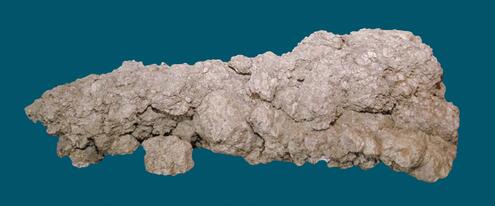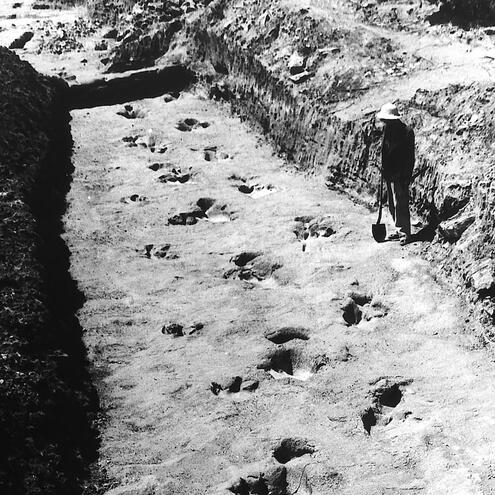What Do You Know About
PaleontOLogy?
Take the quiz below to find out!

What is this fossil?
a petrified sponge from the ocean floor
lava that erupted from an ancient volcano
prehistoric poop left by a dinosaur
ANSWER: prehistoric poop left by a dinosaur
Paleontologists call this type of fossil a coprolite. Millions of years ago, this rock was "dino doo-doo." By studying fossilized feces, paleontologists can learn about the dietary habits of animals that lived long ago.
When did the oldest known dinosaur live?
about 228 thousand years ago
about 228 million years ago
about 228 billion years ago
ANSWER: about 228 million years ago
Since the fossil record is incomplete, scientists don't know for sure when the first dinosaur lived. However, the oldest dinosaur fossils that have been found so far are from small, two-legged dinosaurs that lived about 228 million years ago.
When did the last dinosaur become extinct ?
25 million years ago
65 million years ago
they haven't all become extinct
ANSWER: they haven't all become extinct
Some dinosaurs are alive today! Although many dinosaurs became extinct roughly 65 million years ago, one group of dinosaurs survived: birds. Birds are dinosaurs because they share special characteristics that only dinosaurs have, such as feathers, a wishbone, and a three-toed foot.

What can you tell by looking at dinosaur tracks like these?
the speed of the animal
if it's a boy or girl
how tall it was
ANSWER: the speed of the animal
Scientists look at the spacing of dinosaur footprints in a fossil trackway to help them understand how fast a dinosaur may have moved. By determining the distance between prints in the trackway and using other measurements, paleontologists can estimate the dinosaur's speed.
Which of these animals did NOT live on Earth during the Age of Dinosaurs?
sharks
cockroaches
humans
ANSWER: humans
Sharks and cockroaches lived on Earth long before the first dinosaurs. However, the first humans did not evolve until about 61 million years after the last non-bird dinosaur died.
What did Earth look like when the first dinosaurs were alive?




ANSWER:
When the first dinosaurs were alive, our planet had one large landmass called Pangaea (meaning "All Earth") surrounded by an enormous ocean called Panthalassa (meaning "All Ocean".) Since that time, 228 million years ago, the continents have slowly drifted apart.
Where would be a good place for a paleontologist to search for dinosaur fossils?
in sedimentary rock (rock made of layers of tiny pieces of rock)
in metamorphic rock (rock that has been heated and compressed, changing its composition)
in igneous rock (rock formed from cooling molten rock)
ANSWER: in sedimentary rock (rock made of layers of tiny pieces of rock)
Almost all fossils are preserved in sedimentary rocks . These rocks are made of materials such as rock pieces, sand, soil, mud, and sometimes the remains of organisms such as shells, leaves, or skeletons. As these materials are deposited over millions of years, they slowly turn into sedimentary rock.
What percentage of the American Museum of Natural History's dinosaur collection is on display to the public?
less than 5%
about 50%
more than 75%
ANSWER: less than 5%
Like most major science and art museums, only a tiny fraction of our collection is displayed. For one thing, developing a dinosaur exhibition is very costly and takes many years. So, only the best specimens are prepared for the public. Some dinosaur specimens aren't on display because they are too similar to other fossils already mounted. Some are too incomplete to make sense to the public. And some are only meaningful to professional paleontologists.
How long do scientists think it took for the non-bird dinosaurs to become extinct?
about 10 years
about 1,000 years
nobody knows
ANSWER: nobody knows
The fossil record is very incomplete so scientists have not yet been able to figure out an accurate answer to this question. It might have taken less than 50 years, or perhaps more than a million years.
By studying fossils, what we can know for sure about some extinct dinosaurs?
they had striped, green skin
they made loud noises when they fought each other
they laid eggs
ANSWER: they laid eggs
The fossil evidence doesn't tell us about skin color or animal sounds. However, paleontologists have found fossilized dinosaur eggs.
Image Credits:
Background pattern, © AMNH / Amanda Zaldivar; coprolite, public domain by Karen Chin / USGS; all other photos, AMNH.




 Biodiversity
Biodiversity
 Brain
Brain
 Genetics
Genetics
 Marine BiOLogy
Marine BiOLogy
 MicrobiOLogy
MicrobiOLogy
 PaleontOLogy
PaleontOLogy
 ZoOLogy
ZoOLogy
 AnthropOLogy
AnthropOLogy
 ArchaeOLogy
ArchaeOLogy
 Astronomy
Astronomy
 Climate Change
Climate Change
 Earth
Earth
 Physics
Physics
 Water
Water
